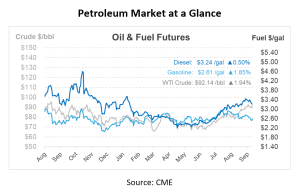
What Is It – ASTM Petroleum Standards
If you’ve ever wondered what ensures the quality, safety, and efficiency of the myriad of products and materials we interact with daily, you’ll find ASTM—or the American Society for Testing and Materials—at the heart of the answer. Though it officially changed its name to ASTM International in 2001 to reflect its global reach, its standards remain a cornerstone in industries ranging from construction to aerospace and, notably, oil and gas.
What is the ASTM?
The ASTM, or American Society for Testing and Materials, is an international organization that develops and publishes a wide range of technical standards for materials, products, systems, and services. These standards are used globally and aim to improve product quality, safety, efficiency, and interchangeability. In 2001, the organization changed its name to ASTM International to reflect its global reach, but the acronym ASTM is still widely used.
ASTM standards in the petroleum industry cover a wide range of topics, from the extraction of crude oil to the production, distribution, and consumption of petroleum products. These standards are commonly used in the oil and gas industry to ensure quality control, facilitate regulatory compliance, and promote safety.
ASTM Petroleum Standards
Petroleum standards developed by ASTM encompass a variety of categories that are crucial to the oil and gas industry. For example, Test Methods outline the accepted procedures for performing specific tests on petroleum products, such as measuring viscosity, sulfur content, and octane number. Specifications set the minimum criteria that a petroleum product must meet to be considered suitable for a specific application. In addition, Guides and Practices offer best practices for various processes like sampling, handling, and storing petroleum and its products. Terminology Standards provide universally accepted definitions for terms commonly used within the industry. Lastly, Classifications help in categorizing different types of petroleum and petroleum-based products based on factors like origin, chemical composition, or intended use. These ASTM standards play a critical role in ensuring the quality and safety of petroleum products while also facilitating international trade by offering a common set of guidelines and practices.
Importance of ASTM Standards
The importance of specific standards can vary based on geographical location, weather trends, market dynamics, and much more. Some ASTM standards may be cited in or referenced by regulations, making them critically important for legal compliance. Emerging trends in the petroleum industry, like increased shale production or the shift towards renewable energy, could make certain standards more pressing. As new technologies are developed, updated standards may become important for ensuring quality, safety, and performance. Standards that help ensure environmental protection and worker safety often gain importance, particularly in the wake of disasters or incidents that highlight shortcomings in existing protocols. Sometimes, the needs of the market can drive the importance of particular standards, such as those concerning product quality or specialized applications.
Compliance with ASTM Standards
Compliance with ASTM petroleum standards is generally a voluntary process, but these standards are often cited or adopted by regulatory agencies, making them effectively mandatory in many cases. Government agencies can adopt ASTM standards into laws or regulations. Once this happens, compliance is no longer voluntary but legally required. One commonly cited example in the United States is ASTM D975, which is a standard specification for diesel fuel oils. This standard outlines the requirements for various grades of diesel fuels. It is frequently referred to by the U.S. Environmental Protection Agency (EPA) and state agencies when setting regulations for diesel fuel quality.
Another example might be ASTM D86, which is a test method for distillation of petroleum products at atmospheric pressure. This standard is often referenced in regulations that specify the allowable composition and characteristics of gasoline, diesel, and other petroleum products.
By incorporating these ASTM standards into regulations, government agencies can set uniform criteria that petroleum products must meet to ensure their quality, safety, and environmental impact are acceptable. These standards then become legally enforceable, meaning that producers, distributors, and vendors must comply with them or face legal repercussions such as fines or even license revocations.
Companies often undergo audits by third-party organizations to verify compliance with ASTM standards. Such audits can be rigorous and comprehensive, covering everything from paperwork to physical inspection of facilities and testing of products. Companies can require that their suppliers also comply with certain ASTM standards. This often becomes part of the contractual obligations between a supplier and purchaser, and failure to comply can result in penalties or termination of the contract. In global trade, adherence to internationally recognized standards like ASTM can be a requirement for importing or exporting petroleum and petroleum products. Non-compliance can result in the barring of products from certain markets.

This article is part of Daily Market News & Insights
Tagged:
MARKET CONDITION REPORT - DISCLAIMER
The information contained herein is derived from sources believed to be reliable; however, this information is not guaranteed as to its accuracy or completeness. Furthermore, no responsibility is assumed for use of this material and no express or implied warranties or guarantees are made. This material and any view or comment expressed herein are provided for informational purposes only and should not be construed in any way as an inducement or recommendation to buy or sell products, commodity futures or options contracts.





